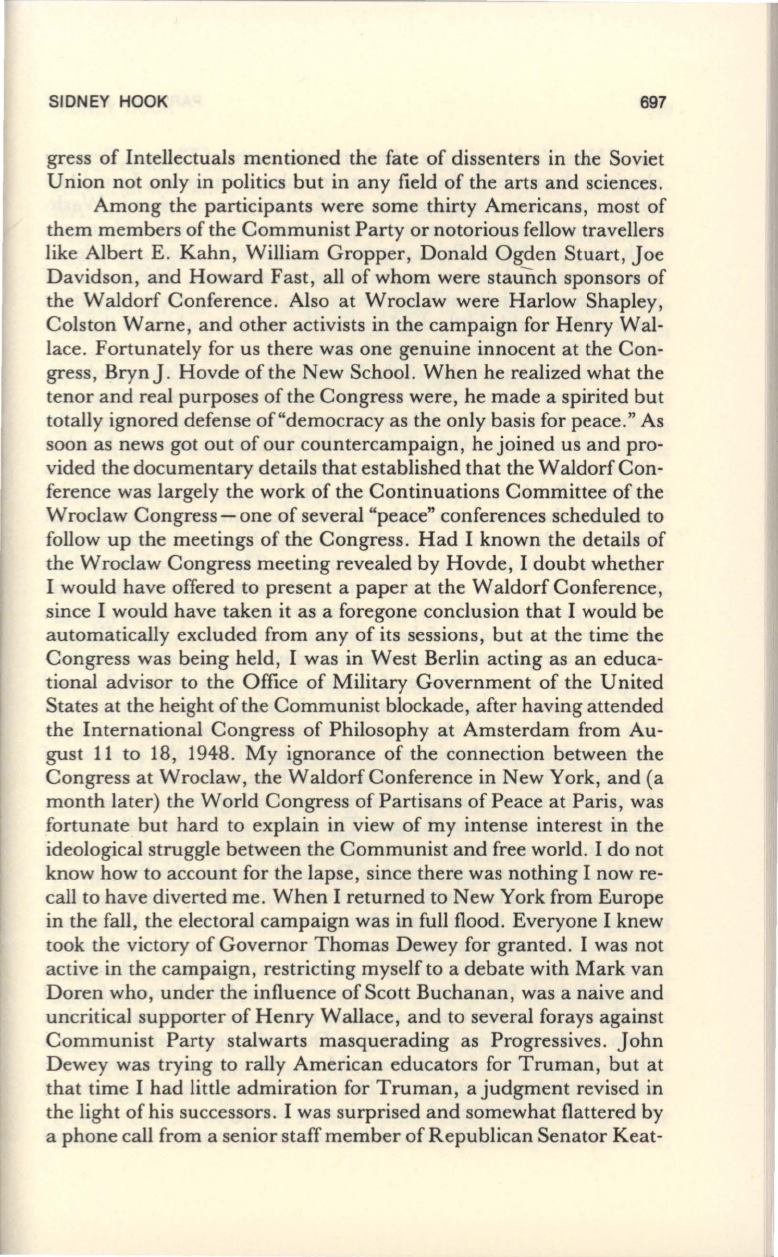
SIDNEY HOOK
697
gress of Intellectuals mentioned the fate of dissenters in the Soviet
Union not only in politics but in any field of the arts and sciences.
Among the participants were some thirty Americans, most of
them members of the Communist Party or notorious fellow travellers
like Albert E . Kahn, William Gropper, Donald Ogden Stuart, Joe
Davidson, and Howard Fast, all of whom were staunch sponsors of
the Waldorf Conference. Also at Wroclaw were Harlow Shapley,
Colston Warne, and other activists in the campaign for Henry Wal–
lace. Fortunately for us there was one genuine innocent at the Con–
gress, BrynJ. Hovde of the New School. When he realized what the
tenor and real purposes of the Congress were, he made a spirited but
totally ignored defense of"democracy as the only basis for peace." As
soon as news got out of our countercampaign, he joined us and pro–
vided the documentary details that established that the Waldorf Con–
ference was largely the work of the Continuations Committee of the
Wroclaw Congress- one of several "peace" conferences scheduled to
follow up the meetings of the Congress. Had I known the details of
the Wroclaw Congress meeting revealed by Hovde, I doubt whether
I would have offered to present a paper at the Waldorf Conference,
since I would have taken it as a foregone conclusion that I would be
automatically excluded from any of its sessions, but at the time the
Congress was being held, I was in West Berlin acting as an educa–
tional advisor to the Office of Military Government of the United
States at the height of the Communist blockade , after having attended
the International Congress of Philosophy at Amsterdam from Au–
gust 11 to 18, 1948. My ignorance of the connection between the
Congress at Wroclaw, the Waldorf Conference in New York, and (a
month later) the World Congress of Partisans of Peace at Paris, was
fortunate but hard to explain in view of my intense interest in the
ideological struggle between the Communist and free world. I do not
know how to account for the lapse, since there was nothing I now re–
call to have diverted me . When I returned to New York from Europe
in the fall, the electoral campaign was in full flood. Everyone I knew
took the victory of Governor Thomas Dewey for granted. I was not
active in the campaign, restricting myself to a debate with Mark van
Doren who, under the influence of Scott Buchanan, was a naive and
uncritical supporter of Henry Wallace, and to several forays against
Communist Party stalwarts masquerading as Progressives . John
Dewey was trying to rally American educators for Truman, but at
that time I had little admiration for Truman, a judgment revised in
the light of his successors. I was surprised and somewhat flattered by
a phone call from a senior staff member of Republican Senator Keat-


